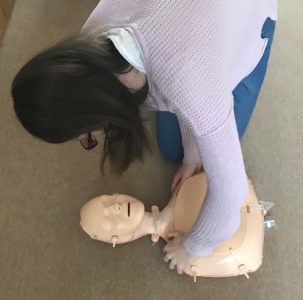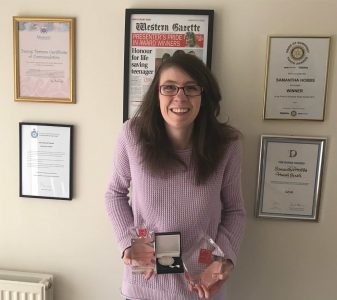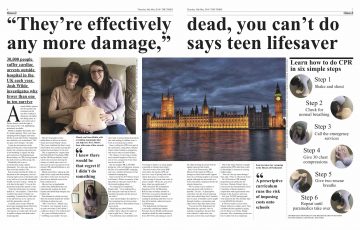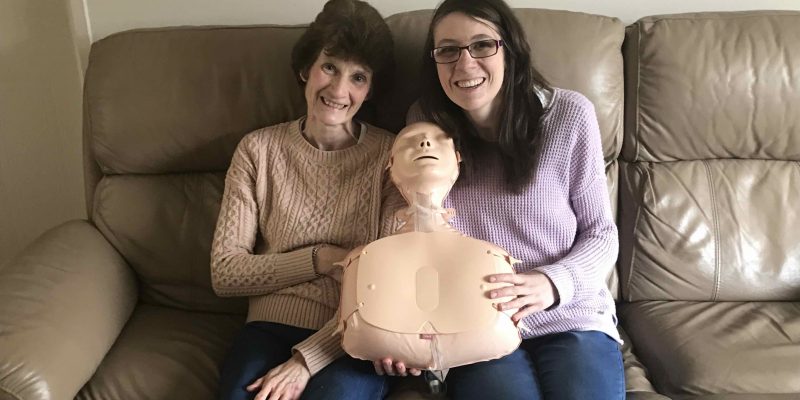Thirty thousand people suffer cardiac arrests outside hospital in the UK each year. Josh Wilde investigates why fewer than one in ten survive
Amanda Hobbs glances into her garden and comments on the rare fine weather as afternoon sun bathes her dining room in a soft yellow glow. Picture frames catch the light as they hang on the wall, highlighting prominent accolades.
Mandy’s daughter Samantha, now 20, stands opposite. They wear close matching brown slippers and smile briefly at each other before explaining this similarity was coincidental. “We are quite close though,” she adds.
A man lies unconscious in the adjacent living area. Sam instinctively checks for a response and realises he is not breathing so signals for help and commences Cardiopulmonary Resuscitation, or CPR, having learned the skill at her local lifesaving club.

Thankfully this is just a plastic mannequin reconstruction. Six years ago, however, Sam saved her mother’s life.
Sam recounts hearing her father on the phone to the emergency services, relaying eight words no husband wants to say and no 14-year-old schoolchild should ever have to hear: ‘I think my wife died in the night’. It was at this point Sam entered her parents’ room.
“After the initial panic my training kicked in,” she explains. “I knew there would be that regret if I didn’t do something. I instructed my Dad what to do and between us we carried on until the paramedics arrived.”
I knew there would be that regret if I didn’t do something.
A cardiac arrest occurs when the heart stops pumping blood effectively around the body. This starves the vital organs of oxygen and will result in sudden collapse and death unless treated quickly.
The first responders used a defibrillator to deliver an electric shock and restart Mandy’s heart. They were confident that Sam’s early intervention was crucial in giving her mother the best chance of survival.
This is supported by a joint report from the British Heart Foundation, BHF, and the UK Resuscitation Council which cites research showing the chance of cardiac arrest survival goes down by up to ten percent every minute CPR and defibrillation is not administered.
Mandy remembers waking up that night with a cough and then nothing until three weeks later, having been placed in an induced coma so her body could recover.
She now has an implantable cardioverter defibrillator that can automatically regulate her heart rhythm and should help mitigate any further risk.
Sam returned to school two days after the incident despite her mother still being in intensive care.
“She’s very brave,” Mandy says. “It must be very traumatic to do it on your own mum, I don’t think I could have done it. I’m really proud.”
It must be very traumatic to do it on your own mum, I don’t think I could have done it.
Six years on Mandy admits to “wobbling occasionally” but says she’s back to normal doing jobs around the house and reading to children twice a week at a local school.
Sam is calling for CPR to be part of the curriculum, citing other countries where school training is compulsory and success rates are much higher.
The chances of surviving a cardiac arrest outside hospital in Norway is one in four, compared to fewer than one in ten in the UK.
She has taught CPR to 100 MPs during six visits to Parliament, become the face of a national BHF campaign, and won a number of honours for her continued campaigning.

Sam received the 2017 Diana Award at St James’s Palace in memory of the late princess who gave much of her life towards helping others.
“It’s changed her completely,” Mandy adds. “Seeing her stand up in front of hundreds of people I was shaking like a leaf and she just got on with it.”
Sam acknowledges the response to her campaign has not always been positive but she is determined to keep going.
“Speaking to my school friends and realising they wouldn’t know what to do made me want to fight for it,” Sam says.
“I’m definitely more confident now. I’m trying to speak to as many people as possible to change their minds.”
Sam also works at her local BHF store where she teaches CPR and sees it as a way of giving back to the charity that means so much to her.
Her message to anyone that wants to learn is simple: “Please do because you never know when you might need it.”
Please do [learn CPR] because you never know when you might need it.
MPs discussed The Compulsory Emergency First Aid Education Bill for state secondary schools in 2015 but it was poorly attended and Conservatives blocked a second reading by speaking until there was no time left to debate, a process known as filibustering.
The Department for Education is currently considering whether Personal, Social, Health and Economic education should be made mandatory from 2019. First aid training is one of the subjects being discussed with an update expected this month.

Sam’s local Conservative MP Marcus Fysh is trained in CPR from his schooldays and would support basic first aid being taught to all young people, although not necessarily as a strict component led by the schools themselves.
“We’re trying to give teachers as much autonomy and freedom as possible,” he says.
“A prescriptive curriculum runs the risk of imposing costs onto schools they don’t currently have to meet. If modules can be taught through charities, communities and other sources then that option makes sense.
“I’m not sure The Department for Education has a positive view of making it compulsory because they want schools to make their own decisions.”
I’m not sure The Department for Education has a positive view of making it compulsory because they want schools to make their own decisions.
One of the major barriers to people administering CPR other than a lack of knowledge is concern of causing further injury.
“You can’t do any more damage,” Sam adds. “They’re effectively dead anyway.”
On 16 October a CPR training programme goes global for the first time. ‘Restart A Heart’ day is overseen by the International Liaison Committee of Resuscitation in conjunction with organisations from Europe to the Americas and Asia.
Last year 195,000 young people were trained in the UK and they hope to top 200,000 this October.
It will also mark six years since Mandy suffered a cardiac arrest. They celebrate the day together by going out for dinner as a family. Simple pleasures, like commenting on the weather, but oh so important.
Image rights reserved by Josh Wilde unless otherwise stated.


 Cherries steal late final-day winner at Burnley
Cherries steal late final-day winner at Burnley